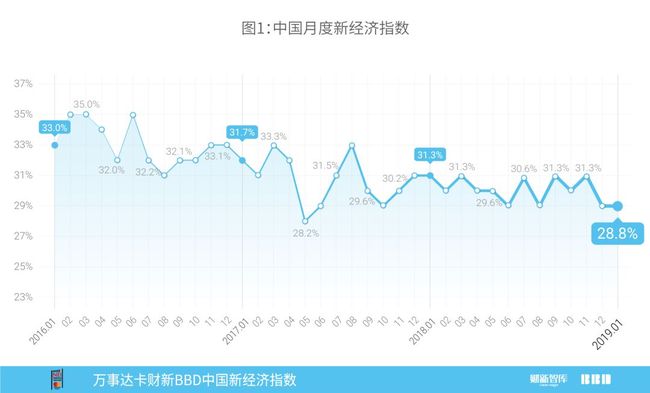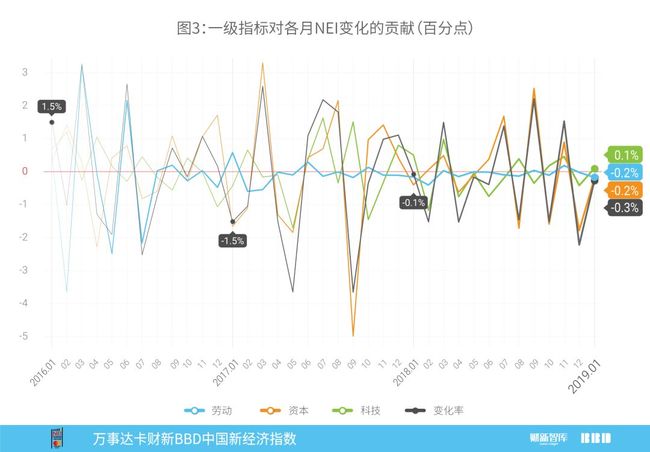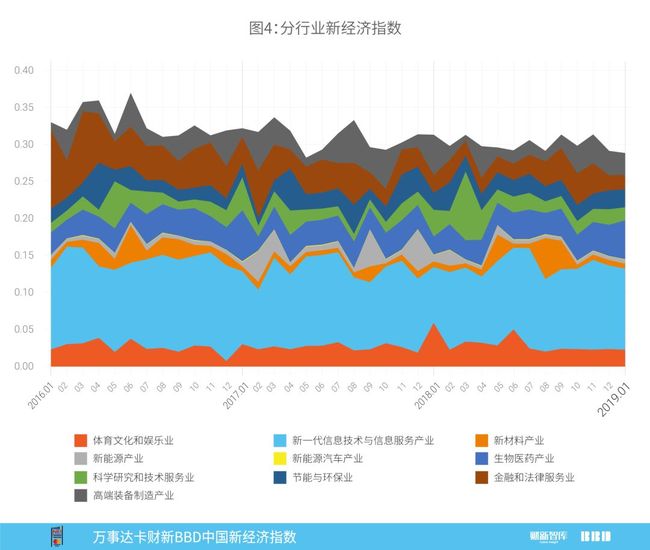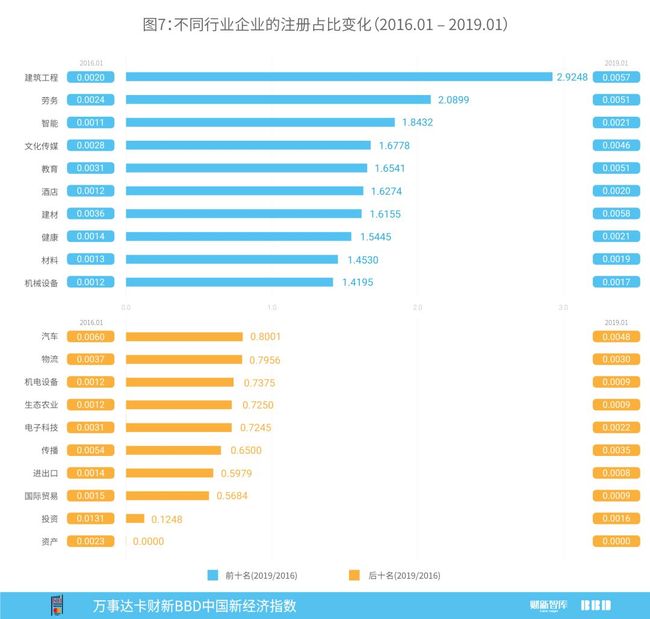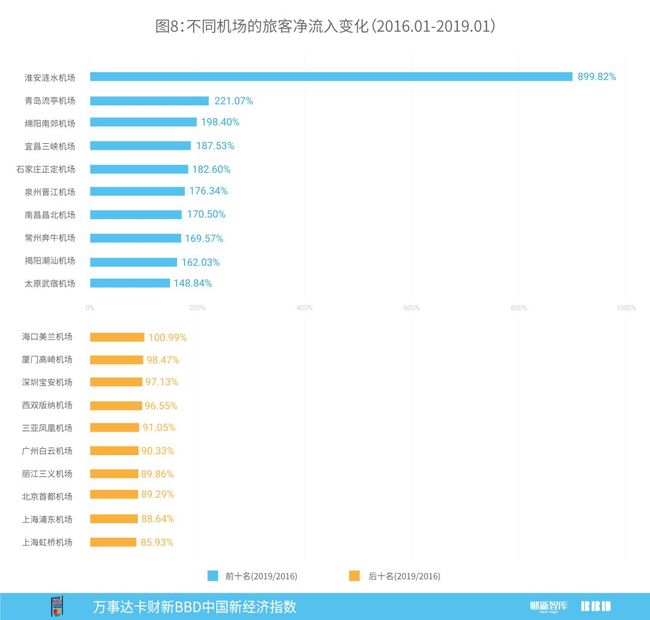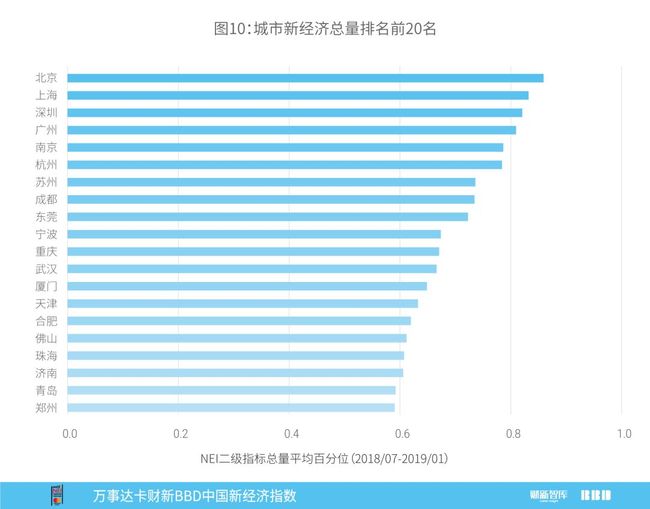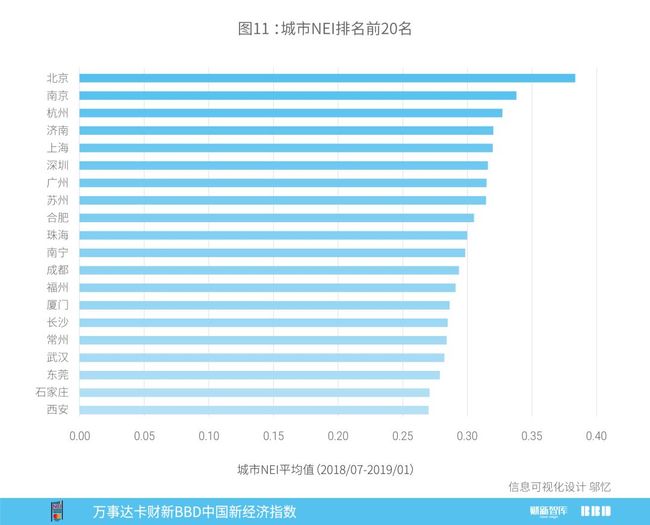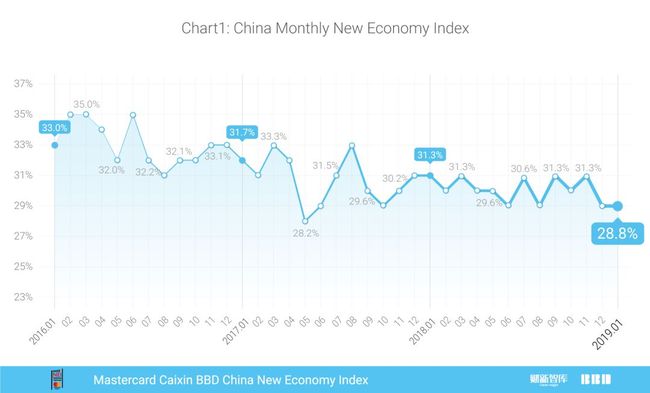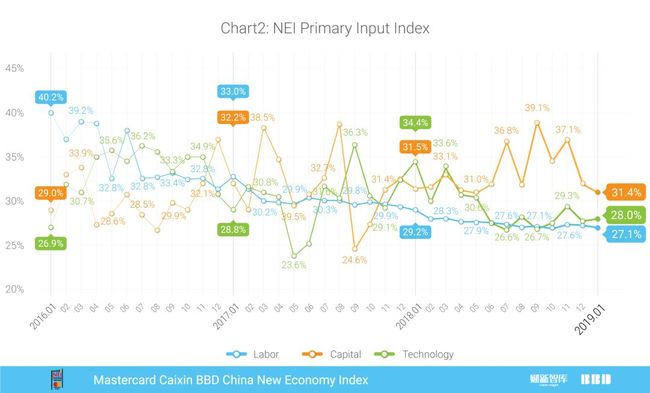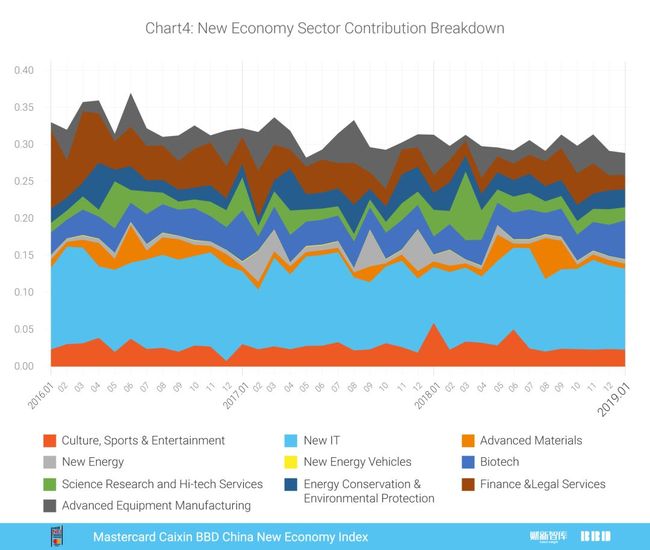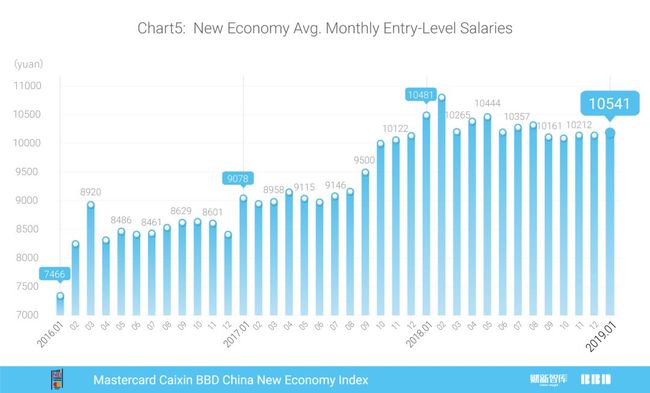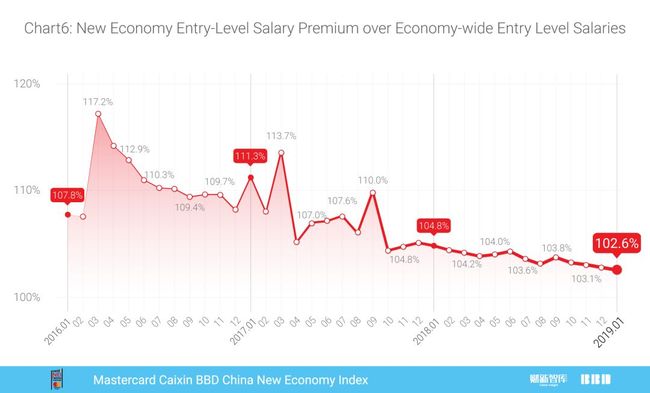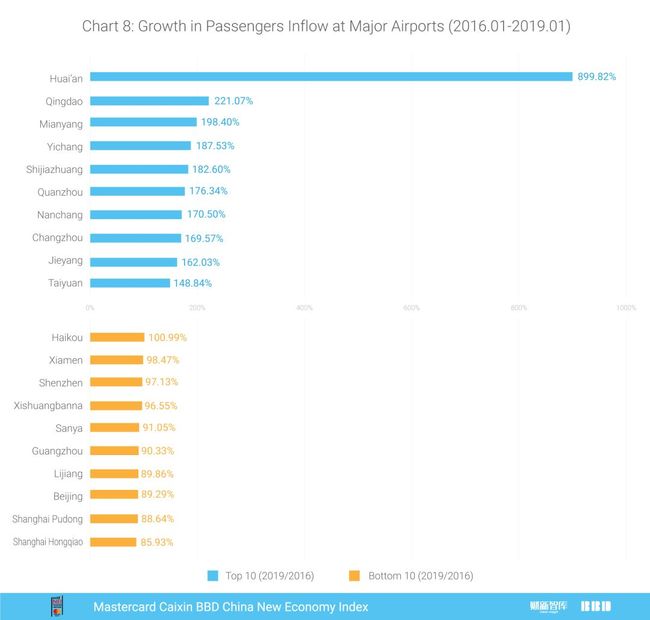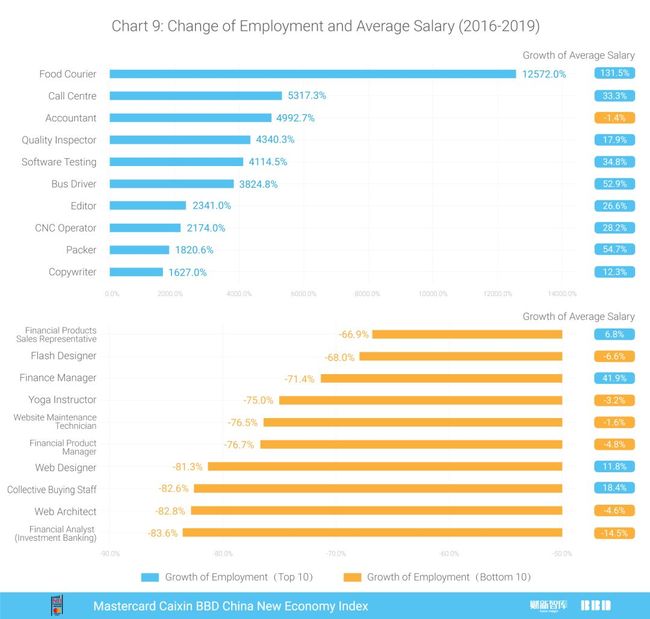1月万事达财新BBD中国新经济指数降至近20月新低
一、指数概览
2019年1月,万事达卡财新BBD中国新经济指数(NEI)录得28.8,即新经济投入占整个经济投入的比重为28.8%。2017年以来,NEI指数波动较大,按可比口径计算,本月NEI比上月下降0.3个百分点(图1)。本月NEI的下降主要来自资本投入的下降。
NEI新经济据于以下定义:首先,高人力资本投入、高科技投入、轻资产;其次,可持续的较快增长;第三,符合产业发展方向。NEI所含行业详见《万事达卡财新BBD中国新经济指数技术报告》与《万事达卡财新BBD中国新经济指数报告(2017年3月)》。
二、主要分项指标
NEI包括劳动力、资本和科技三项一级指标,它们在NEI中的权重分别是40%、35%和25%。2019年1月NEI的下降主要来自资本投入的下降。资本投入指数近一年来波动较大,本月指数录得31.4,环比下降0.6。科技投入指数从2018年7月开始波动回升,本月指数录得28.0,环比上升0.4。劳动力投入指数近半年来波动下降,本月指数录得27.1,环比下降0.4(图2)。
劳动力、资本和科技投入的变化百分比分别为-0.2,-0.2和0.1个百分点,与权重相乘求和后,对2019年1月NEI变化的贡献值为-0.3%(图3)。
分行业看,NEI中占比最大的行业为新一代信息技术与信息服务产业,2019年1月为总指数贡献了10.9个百分点;本月行业排名比较稳定,仅有两个行业发生变化,名次上升的是金融和法律服务业,从上月的第七名上升到本月的第六名,为总指数贡献了2.0个百分点;名次下降的是科学研究和技术服务业,从上月的第六名下降到本月的第七名,为总指数贡献了1.8个百分点(图4)。
三、新经济就业
2019年1月,新经济行业入职平均工资水平为每月10541元,较上月上升255元(图5)。新经济工资主要来自51job、智联招聘、拉钩、赶集网等数个招聘网站的招聘信息,即对劳动力的需求工资。
2019年1月新经济行业招聘人数占全国总招聘人数比例较上月下降0.4个百分点,为26.7%,同时新经济行业招聘总薪酬占全国总薪酬比重下降0.5个百分点,这意味着新经济行业的平均入职工资水平相对于全国平均入职工资水平小幅下降。2019年1月新经济入职工资“溢价”为2.6%,较上月下降0.2个百分点(图6)。本月新经济行业平均工资溢价延续下降趋势。
四、从企业、航班和劳动力数据看近三年经济走势
本月我们利用公司注册、机场流量和员工招聘三项新经济指数使用的独特数据,探寻2016年初到2019年初这段时间中中国经济经历的变化。
我们首先观察2016年1月到2019年1月间,新注册企业所在行业的变化。对于这三年间新注册企业占比在千分之一以上的行业,我们统计出130个关键词,发生较大变化的行业如图7所示。其中,上升最快的行业是建筑工程、劳务、智能、文化传媒和教育,上升幅度均超过60%,酒店、建材、健康、材料、机械设备等新经济相关的产业也有较大幅度上升。而以资产、投资、国际贸易、进出口和传播为关键词的企业注册占比都下降35%以上。
2016年初到2019年初,旅客净流入变化排名前十名与末十名的大中型机场(2016–2019年每日旅客净流入达3000人以上)如图8所示。相比2016年,上海、北京、广州、深圳等一线城市2019年初的机场旅客净流入均停滞不前,其中上海和北京更是下降10%以上,同时,海口、西双版纳、三亚和丽江等旅游城市的旅客净流入也小幅下降。但淮安、青岛、绵阳、宜昌等地2019年初的旅客净流入则大幅增长,其中淮安涟水机场的旅客净流入上升到了2016年的9倍。这显示出过去三年来二线城市尤其是中西部二线城市的快速发展态势。
图9显示了不同招聘岗位在2016年初和2019年初的需求变化和工资变化。在需求增长最快的前十名岗位中,送餐员、呼叫中心客服、会计、质量检验员和软件测试位列前五,其次是客运司机、编辑、数控操机、包装工和文案,这些岗位的需求增长都在1700%以上,平均工资增长40%。其中送餐员的需求涨幅最高,增长了127倍,且工资也上升到三年前的2.3倍,而会计的需求虽然大幅上涨,但工资3年以来基本持平,这说明其需求增长和供给增长可能是同步的。
需求减少最快的岗位包括投资银行财务分析、网站架构设计师、团购业务员、网站策划等岗位,这些岗位的工资平均水平仅上升了4%。这十个岗位主要是2016年互联网科技和共享科技快速发展时的热门岗位,比如曾经百团大战高需求但如今规模骤减的团购业务员;曾经活跃于资本市场的融资经理和投资银行财务分析;曾经与移动客户端并重但现在已经被许多公司抛弃的桌面客户端的网站构架设计师等。
五、城市新经济排名
2019年1月新经济总量城市排名前20名如图10所示,北京、上海、深圳、广州和南京排名前五。该排序计算每个投入指标在所有城市中的排序百分位,再将百分位加权平均,体现的是近半年城市间新经济总量排名。
图11计算了2018年7月到2019年1月城市NEI平均排名,前五名为北京、南京、杭州、济南、上海。
更多咨询敬请联络:
万事达卡
大中华区公共关系副总裁 吴焕宇
电话:+86-10-8519-9304
财新智库
财新智库高级经济学家 王喆
电话:+86-10-85905019
公关总监 马玲
电话:+86-10-8590-5204
BBD(数联铭品)
BBD(数联铭品)首席经济学家 陈沁
电话:+86-28-65290823
版权声明
万事达卡财新BBD中国新经济指数,是由财新智库(深圳)投资发展有限公司和成都数联铭品科技公司共同研发,与北京大学国家发展研究院合作,经过近一年努力,于2016年3月2日在北京首发的指数产品,此后每月2日上午10:00发布上月数据。
关于万事达卡:
万事达卡(纽交所股票交易代码:MA),www.mastercard.cn,是全球性的支付与科技公司。通过运营全球最快的支付处理网络,万事达卡将超过210个国家和地区的消费者、金融机构、商户、政府和企业连接在一起。万事达卡的产品和解决方案使得每个人在购物、旅行、企业经营、财务管理等日常商业活动都变得更容易、更安全和更高效。敬请关注我们的“万事达卡”官方微信以及在新浪的官方微博@万事达人,以获悉动态并参与互动。也可访问万事达卡新闻中心或万事达卡互动中心获取更多资讯。
关于财新:
财新传媒是提供财经新闻的全媒体集团,依托专业的团队和强大的原创新闻优势,以网站、移动端、期刊、视频、图书、会议等 多层次的业务平台,为中国最具影响力的受众群,提供准确、全面、深入的财经新闻产品。财新智库是财新传媒通过孵化另行建立的高端金融资讯服务平台,旨在通过发展金融数据业务,壮大宏观经济研究队伍,服务于智库业务客户。详细信息,敬请浏览www.caixin.com。
关于BBD:
BBD(数联铭品)是行业领先的大数据解决方案提供商,紧密围绕新经济,通过动态尽调、信用评级、风险定价和经济指数四个步骤,BBD提供从微观到宏观的大数据服务。详细信息,敬请浏览:http://www.bbdservice.com。
Mastercard Caixin BBD China New Economy Index
Overview
In January 2019, the Mastercard Caixin BBD New Economy Index (NEI) reading came in at 28.8, indicating that the New Economy accounted for 28.8% of overall economic input activities that month, down 0.3 ppts from December (Chart 1). The declining NEI was due to the decrease of capital input. New economy is defined as following: 1) human capital intensive, technology intensive and capital light, 2) sustainable rapid growth, and 3) in line with the strategic new industries defined by the government. Please refer to our previous reports (March 2016 and March 2017) for the list of NEI sectors.
Primary Inputs
The NEI includes labor, capital and technology inputs that account for 40%, 35% and 25% of the total weights of the index, respectively. The decline in the January NEI reading came from the decrease of capital input (Chart 2). Capital input fluctuated widely in the recent year, dropping to 31.4 this month, with 0.6 MoM decrease. Technology input index was on an uptrend since July 2018, coming in at 28.0 this month, with 0.4 MoM increase. Labor input index showed a stable trend in recent half year, decreasing slightly to 27.1 this month, with 0.4 MoM decrease.
Taking the weights into account, percentage changes in labor, capital and technology inputs were -0.2, -0.2, and 0.1 ppts, respectively. The net NEI change was -0.3 ppts in total (Chart 3).
As for sectors, the New IT industry formed the largest proportion of the New Economy Index, contributing 10.9 ppts to NEI. The rankings were at large unchanged except that Finance & Legal Services and Science Research and Hi-tech Services exchanged their positions (Chart 4).
New Economy Employment
In January 2019, the average monthly entry-level salary of the New Economy was RMB 10,541, increasing from last month’s level of RMB 10,286 (Chart 5). New Economy wage information is compiled from online websites of career platforms and recruitment services including 51job and Zhaopin, as well as other sites that list job openings.
Hiring in the New Economy sectors accounted for 26.7% of the total in January, 0.4% lower than the previous month. At the same time, the compensation share of New Economy decreased 0.5 ppt. Accordingly, the average entry salary level of New Economy declined slightly compared to the whole economy. The entry-level salary premium of the New Economy decreased from 2.8% in December 2018 to 2.6% as compared to economy-wide counterparts (Chart 6), hitting the lowest ever since the index was published.
Economic Trends Based on Enterprises, Airport and Employment Data
This month we explored the economic change in China from 2016 to 2019 using data in newly-established enterprises, passengers inflow at major airports and employment.
We monitored the sub-sectors of newly-established enterprises from January 2016 to January 2019. For the sub-sectors in which new enterprises were established in the past three years, we had keywords with significant changes shown in Chart 7. Among them, newly-established enterprises in Construction Engineering, Labor, Smart, Media and Education increased by more than 60%, which showed the fastest growth in the past three years. Other fast-growing sub-sectors included Hotel, Building Materials, Health, Materials and Mechanical Equipment. The proportion of newly-established enterprises of Asset, Investment, International Trade, Import and Export, and Communication declined by more than 35%.
In terms of the growth in passengers net inflows since the beginning of 2016, the airports (daily passengers net inflow reaching 3000 during 2016 to 2019) winning and losing most passengers were shown in Chart 8. Compare to 2016, the passengers net inflows at four first-tier cities’ airports in January 2019 didn’t grow at all. Beijing and Shanghai airports even losing more than 10% of passengers. Meanwhile, some tourist cities also observed slightly decreasing passengers net inflows, including Haikou, Xishuangbanna, Sanya and Lijiang. However, the passengers net inflows in Huai’an, Qingdao, Mianyang and Yichang increased significantly compared to January 2016. The boost in Huai’an was so remarkable that the passengers net inflows at Lianshui Airport increased to 9 times. The change in the passengers net inflows showed the rapid development of second- and third-tier cities in the past three years, especially those in the central and western regions.
Chart 9 showed the changes of employment and average salary from early 2016 to 2019. Jobs with fastest growth in employment were food courier, call center, accountant, quality inspector and software testing, following by bus driver, editor, CNC operator, packer and copywriter, all of which increased by more than 1700% in employment and 40% in average salary. Among them, food courier’s employment increased by 127 times, the biggest growth since 2016, and the average salary rose to 1.3 times higher than that of 2016. The average salary of accountant showed a flat trend with the employment rising sharply, indicating the synchronized growth of demand and supply for labor.
The positions with fastest decline in employment included financial analyst (investment banking), web architect, collective buying staff, and web designer, whose average salaries only increased by 4%. These ten positions were mainly the popular jobs benefitting from the rapid development of Internet and sharing technology since 2016. For example, collective buying staff was in high demand when groupon markets were fiercely competitive three years ago. Finance manager and financial analyst (investment banking) was so active in the capital market and web architect focusing on desktop application was popular back in 2016.
City Rankings of the New Economy
Based on overall New Economy rankings, the top twenty cities were shown in Chart 10. The top five cities were Beijing, Shanghai, Shenzhen, Guangzhou and Nanjing. Rankings are based on a weighted average of the percentile rank of indicators for the city in the past six months.
Chart 11 showed the average NEI city rankings between July 2018 and January 2019. The top five cities were Beijing, Nanjing, Hangzhou, Ji’nan and Shanghai.
For further information please contact:
Mastercard
Mr. Wu Huanyu, Director, Communications
Tel:+86-10-8519-9304
Email:[email protected]
Caixin Insight Group
Dr. Wang Zhe, Senior Economist
Tel:+86-10-85905019
Emails:[email protected]
Ma Ling, Public Relations
Tel:+86-10-8590-5204
Email:[email protected]
BBD
Dr. Chen Qin, Chief Economist
Tel:+86-28-65290823
Emails:[email protected]
The Mastercard Caixin BBD China New Economy Index is the fruit of a research partnership between Caixin Insight Group and BBD, in collaboration with the National Development School, Peking University. The subject of a year of research, the NEI was first publically released on March 2, 2016 and will be issued the 2nd of every month at 10:00am China Standard Time.
About Caixin
Caixin Media is China's leading media group dedicated to providing financial and business news through periodicals, online content, mobile applications, conferences, books and TV/video programs. Caixin Media aims to blaze a trail that helps traditional media prosper in the new media age through integrated multimedia platforms. Caixin Insight Group is a high-end financial data and analysis platform. For more information, please visitwww.caixin.com.
About Mastercard
Mastercard (NYSE: MA),www.mastercard.com, is a technology company in the global payments industry. We operate the world’s fastest payments processing network, connecting consumers, financial institutions, merchants, governments and businesses in more than 210 countries and territories. Mastercard’s products and solutions make everyday commerce activities – such as shopping, traveling, running a business and managing finances – easier, more secure and more efficient for everyone. Follow us on Twitter @MastercardAP and @MastercardNews, join the discussion on the Beyond the Transaction Blog and subscribe for the latest news on the Engagement Bureau.
About BBD (Business Big Data)
BBD is a leading Big Data and quantitative business analytics firm specializing in the analysis of the high-growth industries emerging in Mainland China. Through dynamic data tracking, credit analysis, risk pricing and economic index construction, BBD provides its clients with a wide range of services at both the macro and micro level. For more information, please visithttp://www.bbdservice.com/.

